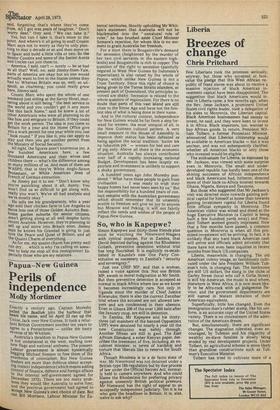Papua-New Guinea
perils of
independence
Molly Mortimer
Exactly a century ago, Captain Moresby the Basilisk into the harbour that
Dears his name, and onApril 23 ran up the 'Union Jack over New Guinea. It took a reluctant British Government another ten years to agree to a Protectorate — unlike the hasty reverse of Mr Whitlam.
Australia's thraldom to Papua-New Guinea is not understood in the west, mulling over new flags and national anthems. The present Labour government is almost hysterically begging Michael Somare to free them of he anathema of colonialism. But New Guinea leaders are more than dubious about accepting instant independence (which means adding control of finance, defence and foreign affairs to the internal self-government agreed for December 1973). There are too many problems they would like Australia to solve first; and the previous government had agreed to accept New Guinea's own choice of date. But not Bill Morrison, Labour Minister for Ex
ternal territories, Stoutly upholding Mr Whitlam's statement that Australia will not be blackmailed into the "unnatural role of ruler," he has brushed aside Chief Minister Somare's rejection, for whom this is no moment to grant Australia her freedom.
For a start there is Bougainville's demand for secession (heightened by the murder of her two civil servants in the eastern highlands) and Bougainville is rich in copper. The question of the right to secession (painfully negated in West New Guinea by Indonesia's imperialism) is also raised by the whole of Papua, which unlike New Guinea is not a Trust Territory. Since this right of choice is being given to the Torres Straits islanders, at present part of Queensland, the principles involved are shaky. Secession is related to the whole question of regionalism. For there is no doubt that parts of this vast island are still close to the Stone Age and have not the faintest idea of what is being done in their name.
And in the cultural context, independence for New Guinea would be far from a step forward for women, the most unequal of all, in the New Guinean cultural pattern. A very small measure in the House of Assembly to improve their status has been defeated as being against the social tradition: 'karim lek na lukautim pik ' — women for bed and care of pig only. Above all there is the economic situation. Australia has always contributed over half of a rapidly increasing national Budget. Development has been largely expatriate and investment is unlikely to support a shaky government.
A hundred years ago John Moresby pondered; " What have these people to gain from civilisation . . . I was ready to wish their happy homes had never been seen by us." But the responsibility for a hundred years of contact remains with the Australian government which should remember that its unseemly scuttle to freedom will give no joy to anyone but Moscow and Peking; it will not faintly reflect the needs and wishes of the people of Papua-New Guinea.
So who is Kapepwe?
Simon Kapepwe and thirty-three friends plus must be watching the Niesewand Niagara with cynical interest. For in Zambia, that David depicted darling against the Rhodesian Goliath, preventive detention without trial has long flourished. It is explicitly re-established in Kaunda's new One Party Constitution as necessary to Zambia's "security and sovereignty." Just one UNIP MP, and that a woman, raised a voice against this. Not one British MP, awash in moral indignation at Mr Smith. But then preventive detention is accepted as normal in black Africa where law as we know it becomes increasingly rare. Not only in Uganda since the murder of Chief Justice Kiwanuke; there is also the current Zanzibar trial where the accused are not allowed lawyers and are condemned in their absence. Even in Ghana 200 of the over 1,000 held after the January coup, are still in detention.
In Zambia, Mr Kapepwe and his thirtythree (all members of the banned Opposition UPP) were detained for nearly a year till the new Constitution was safely through. Another fifteen are still in gaol. The East African Standard, a sober Kenyan paper, describes the treatment of five, including an excabinet minister, in terms of hardship and torture that liberals like to reserve for South Africa.
Though Rhodesia is in a de facto state of war, Mr Niesewand was not detained under a British-type 18b regulation but by due process of law under the Official Secrets Act, normally held in camera anywhere. And who could blame the Rhodesians for preferring privacy against unseemly British political pressure. Mr Nieswand has the right of appeal to an acceptedly independent ludiciary. Yet it is he who gets the headlines in Britain. It is, alas, naïve to ask why?


































 Previous page
Previous page